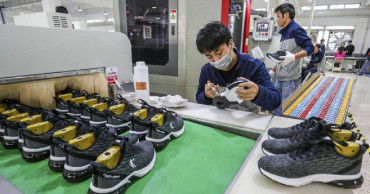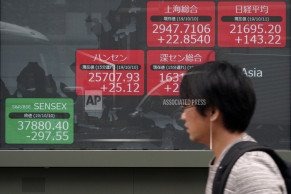Trade war
Asian shares gain after Wall Street’s rally, but hopes are tempered by trade war uncertainties
Asian markets moved higher on Tuesday after China and the United States agreed to a 90-day pause in their ongoing trade conflict. However, the momentum was limited by lingering uncertainty, as analysts cautioned that President Donald Trump’s policies could still shift unexpectedly.
In a joint announcement, both countries said they would lower tariffs — the U.S. reducing duties on Chinese imports to 30% from a peak of 145%, while China would drop its tariffs on American goods to 10% from 125%. The temporary truce allows additional time for continued negotiations following recent talks in Geneva, Switzerland, which the U.S. described as having made "substantial progress."
“The result exceeded most expectations and offered reassurance to investors,” said Stephen Innes of SPI Asset Management.
“Make no mistake, this was highly stage-managed diplomacy. But the optics are good and the implications real. It signals that even this administration recognizes the economic drag of unrelenting tariffs,” he said in a commentary.
Tokyo’s Nikkei 225 jumped 1.8% to 38,326.37. Automakers were among the big gainers, with Toyota Motor Corp. up 3.7% and Suzuki Motor Corp. 4.6% higher.
Nissan Motor Co. added 3.2% after Japan’s national broadcaster NHK said it plans to lay off more than 10,000 of its workers, raising the total to 20,000, as part of its restructuring efforts. The company was due to announce its financial results for the last fiscal year later Tuesday.
The Kospi in South Korea gained 0.2% to 2,612.30.
Gold price reduced by Tk3137 per bhori, effective from Tuesday
Hong Kong’s Hang Seng, which gained 3% a day earlier after Chinese and U.S. officials announced the agreement to pause tariffs and reduce them, fell 0.7% to 23,374.06 on heavy selling of technology shares.
The Shanghai Composite index edged 0.2% higher to 3,374.93. Taiwan’s Taiex jumped 1.9%.
Australia’s S&P/ASX 200 climbed 0.6% to 8,281.40.
On Monday, the world’s two largest economies agreed to take down temporarily most of their tariffs against each other.
The S&P 500 shot up 3.3% to pull back within 5% of its all-time high set in February. It’s been roaring higher since falling nearly 20% below the mark last month on hopes that President Donald Trump will lower his tariffs after reaching trade deals with other countries.
Closing at 5,844.19, the index at the heart of many 401(k) accounts is back above where it was on April 2, Trump’s “Liberation Day,” when he announced stiff worldwide tariffs that ignited worries about a potentially self-inflicted recession.
The Dow Jones Industrial Average jumped 1,160 points, or 2.8%, to 42,410.10. The Nasdaq composite surged 4.3% to 18,708.34.
A global economy less burdened by tariffs will likely burn more fuel, so the agreement to scale back tariffs by more than what many investors expected also boosted oil prices. But early Tuesday, they fell back. U.S. benchmark crude oil lost 6 cents to $61.89 per barrel. Brent crude, the international standard, shed 8 cents to $64.88 per barrel.
The value of the U.S. dollar strengthened against everything from the euro to the Japanese yen to the Swiss franc. And Treasury yields jumped on expectations that the Federal Reserve won’t have to cut interest rates as deeply this year as earlier expected.
Early Tuesday, the dollar was trading at 147.98 Japanese yen, down from 148.47 yen. But it gained against the euro, climbing to $1.1101 from $1.088.
The move announced Monday could add 0.4 percentage points to the U.S. economy’s growth this year, according to Jonathan Pingle, U.S. chief economist at UBS. The U.S. economy shrank at a 0.3% annual rate in the first three months of the year.
9 months ago
Paul Krugman slams US tariffs on Bangladeshi clothing
Nobel Prize-winning economist Paul Krugman has criticised the imposition of high tariffs on imports of clothing from Bangladesh, calling it a wrong move.
“Putting high tariffs on imports of clothing from Bangladesh is exactly what you shouldn’t be doing. That’s the kind of thing that is disruptive, raises the cost of living for American consumers, does nothing to make us more secure,” Krugman, who specialises in trade, told The New York Times during a recent interview.
US reciprocal tariff move risks global trade disruption: ICC
There may be a national security argument for domestic production, as well as for friendshoring and nearshoring, because goods that are closer are easier to secure. “But if that were our goal, we wouldn’t be levying tariffs on Vietnam and Bangladesh, and we certainly wouldn’t be imposing tariffs on Canada and Mexico,” he said.
Krugman said that the trading system, which Donald Trump is now dismantling, was developed with a focus on both economic efficiency and a more enlightened, broader perspective on national security.
Dr Yunus urges Trump to delay reciprocal tariffs on Bangladesh by 3 months
He referenced Cordell Hull, F.D.R.’s secretary of state, who believed that strengthening economic links across the free world could promote solidarity among democracies and counter the threat of Stalinism.
“So what we’re doing is tearing up — partially in the name of national security — a policy that was partially intended to enhance national security,” he added.
There’s no question that the U.S. is alienating its allies — or its worthwhile allies — by doing all of this. And in some cases, they’re making common cause with our potential enemies,” he also said.
Krugman also discussed the influence of political figures on trade policy, saying, “We have some direct evidence that’s what’s happened. Peter Navarro, who is sort of Trump’s trade czaar. I don’t know if he is still called that. But effectively, at least according to some of the reporting, he was recruited because they basically sent Jared Kushner out to search through Amazon and find somebody who had written books hostile to China.”
Govt initiates talks with US over newly imposed tariffs: Finance Adviser
He went on to say that One of the most interesting cases was Bob Lighthizer, a longstanding contrarian and protectionist voice in Washington. While many see him as a negative force in trade policy, he is respected for his expertise. People expected him to play a key role in the Trump administration, but he was overlooked. Likely because he is independent and didn’t align himself with Trump’s views. “So he might actually say to the king: No, not tariffs on Bangladesh.”
10 months ago
China vows to fight after Trump threatens more tariffs
China declared on Tuesday that it would “fight to the end” and implement countermeasures to protect its interests after U.S. President Donald Trump threatened to impose a further 50% tariff on Chinese goods.
The Commerce Ministry criticised the United States for introducing what it termed “so-called ‘reciprocal tariffs,’” describing them as “completely groundless” and an example of “typical unilateral bullying.”
China has already responded with retaliatory tariffs and signalled in its latest statement that more could follow.
“The countermeasures taken by China aim to safeguard its sovereignty, security, and development interests, as well as to uphold the normal order of international trade. These actions are entirely lawful,” the ministry stated. “The U.S. decision to escalate tariffs on China is a repeated blunder and again highlights the coercive nature of the U.S. approach. China will never yield. Should the U.S. persist, China will fight to the end.”
Trump’s latest threat, issued on Monday, sparked renewed fears that his efforts to restructure global trade could trigger a deeper and more damaging trade war. Stock markets from Tokyo to New York have experienced increased volatility as tensions rise.
Trump warns of additional tariffs on China
The threat followed China’s announcement that it would retaliate against tariffs introduced by Trump the previous week.
“If China does not withdraw its 34% increase, which adds to their already long-term trade abuses, by April 8th, 2025, the United States will impose ADDITIONAL tariffs of 50% on China, effective April 9th,” Trump wrote on Truth Social. “Furthermore, all discussions with China regarding their requested meetings will be cancelled!”
If enacted, the new tariffs would raise the total U.S. duty on Chinese imports to 104%. This includes the new 50%, plus the 20% levied as a penalty for fentanyl trafficking and an earlier 34% announced last week. These increases could lead to higher costs for U.S. consumers and prompt China to redirect lower-cost goods to other markets while strengthening trade ties with partners such as the European Union.
During his first term, Trump frequently pointed to stock market gains as a measure of success, and some analysts believed the threat of market losses could discourage aggressive economic policies during a second term. However, that hasn’t held true, as Trump has downplayed economic disruptions.
“I don’t mind going through it because I see a beautiful picture at the end,” he remarked.
Although Trump administration officials have regularly appeared on TV to defend the tariffs, their arguments have failed to calm the financial markets. The only temporary lift came from a false report claiming top economic adviser Kevin Hassett said Trump was considering pausing all tariffs except on China. Markets surged before the White House dismissed the claim as “fake news.”
China remains one of the largest U.S. trading partners, especially in consumer goods. Tariffs, which are effectively taxes on imports paid by American companies, are likely to result in higher prices for U.S. consumers.
Federal Reserve Chair Jerome Powell on Friday warned that these tariffs might fuel inflation. “There’s a lot of waiting and seeing going on, including by us,” he said, noting no immediate decisions would be taken.
European Commission President Ursula von der Leyen responded by saying the EU would seek trade opportunities with other nations beyond the U.S., pointing out there are “vast opportunities” elsewhere.
Dr Yunus urges Trump to delay reciprocal tariffs on Bangladesh by 3 months
In 2024, U.S. trade in goods with China totalled an estimated $582 billion, making China the top trading partner. The U.S. trade deficit in goods and services with China that year ranged between $263 billion and $295 billion.
10 months ago
Trump to seek trade negotiations as Americans feel the impact of the trade war: Canadian PM
New Canadian Prime Minister Mark Carney said Friday that U.S. President Donald Trump will eventually engage in comprehensive trade discussions with Canada, as Americans will bear the consequences of Trump’s trade war.
Carney emphasized that talks won’t take place “until we get the respect we deserve as a sovereign nation," adding that this should not be a difficult expectation to meet.
On Friday, Trump continued his frequent criticism of Canada, reiterating his view that the country should be the 51st U.S. state and claiming that the U.S. keeps Canada “afloat.”
“When I say they should be a state, I mean that,” Trump said.
Carney met with provincial leaders at the Canadian War Museum in Ottawa, where he announced relief measures for workers and businesses impacted by the trade conflict and outlined steps to accelerate resource projects.
Since taking office last Friday, Carney has yet to have a phone call with Trump. While Trump previously mocked former Prime Minister Justin Trudeau by referring to him as "Governor Trudeau," he has not yet commented on Carney by name.
Carney stated that he seeks a broad discussion with the U.S. on trade and security, rather than negotiations focused solely on tariffs.
“In the end, Americans will suffer from their own trade policies. That’s why I am confident that a serious discussion will happen—with the respect and scope it deserves,” Carney said. “I’m ready whenever they are.”
Trump has imposed 25% tariffs on Canadian steel and aluminum and has threatened sweeping tariffs on all Canadian exports and other trade partners starting April 2.
Carney took office after winning the Liberal Party leadership following Trudeau’s resignation earlier this year. He is expected to initiate early parliamentary elections this Sunday, with voting anticipated before April 28.
The Liberals were on track for a significant electoral defeat this year until Trump’s trade war reshaped Canadian politics. His repeated attacks on Canada’s sovereignty have angered many Canadians, leading to boycotts of American goods and travel. This surge in national pride has boosted Liberal support in the polls.
Carney said Canada’s provincial premiers have agreed to develop a national trade and energy corridor to diversify trade.
This plan could include a pipeline from Alberta’s oil fields to Eastern Canada. While Quebec previously opposed such a project, Premier François Legault now suggests attitudes are shifting due to Trump’s threats. Carney noted that Quebec consumes about 350,000 barrels of oil daily, with 70% imported from the U.S.
“That’s not a sustainable situation for us. There is an opportunity for a pipeline, but we need social acceptance and Indigenous partnerships,” Carney said.
To accelerate infrastructure projects, the federal government will recognize provincial assessments. Canadian leaders also discussed swiftly removing internal trade barriers between provinces and the federal government.
Additionally, Carney announced that Ottawa will waive the one-week waiting period for employment insurance for workers affected by tariffs. Canadian businesses will also be allowed to temporarily defer income tax and sales tax payments to improve cash flow.
11 months ago
China criticises US tariffs, warns of trade war losses
China will not succumb to intimidation and can withstand the increased tariffs imposed by US President Donald Trump, along with other economic challenges, the Chinese commerce minister stated on Thursday, reports AP.
However, he emphasised that “there are no winners in a trade war.”‘
If US wants war, we are ready’: China
Addressing reporters on the sidelines of China’s annual national congress session, Wang Wentao reaffirmed Beijing’s call for negotiations. He asserted that coercion and threats would not succeed, highlighting China’s role as a key trading partner for 140 nations, which provides it with diverse alternatives. Wang and other officials outlined Beijing’s economic and financial strategies but did not introduce any major new initiatives.
China open to dialogue but resolute against US tariffs
Since taking office in January, the Trump administration has twice raised tariffs on Chinese imports. In retaliation, China has imposed duties and other restrictions on American goods and businesses. Wang stressed that China expects mutual respect in its international dealings.
“Coercion and threats will not work on China, nor will they intimidate us. China remains steadfast in defending its own interests,” Wang stated, reiterating that “there are no winners in a trade war.”
“If the US continues down this misguided path, we will respond accordingly,” he warned. “We will fight to the end.”
Despite the firm stance, Wang underscored China’s willingness to resolve trade disputes through dialogue. “Our two sides can meet at an appropriate time, and our teams can initiate discussions as soon as possible,” he said.
He also dismissed Trump’s claim that China is responsible for America’s fentanyl crisis—used as justification for imposing 20% tariffs on all Chinese imports—stating that such accusations would not address the issue.
China’s diverse global trade options
As the primary trading partner of 140 countries and regions, China has secured free trade agreements (FTAs) with over 30 nations, Wang noted.
“We are prepared to sign more FTAs,” he added.
Acknowledging the difficulties faced by Chinese exporters, Wang explained that Beijing is supporting businesses in expanding their global reach through trade fairs and international ventures. The Chinese government is also increasing financial assistance for export credit while aiming to boost trade in services and e-commerce.
“We do not rely on a single market,” he remarked.
China keeps its economic growth target at 'around 5%' despite a looming trade war
Strengthening domestic consumption and investment
China’s economic growth has been weighed down by a sluggish housing market, weak stock performance, limited social welfare, and job losses since the COVID-19 pandemic.
Zheng Shanjie, head of the National Development and Reform Commission, China’s top economic planning agency, acknowledged that growth projections for 2025 range between 4.6% and 4.8%, falling short of the government’s 5% target.
To stimulate the economy, Zheng revealed that authorities are drafting a “specialised plan of action” aimed at boosting consumer spending and business investment, though he did not disclose specific measures.
Finance Minister Lan Fo-an added that China would increase spending on “livelihood and consumption,” pledging more support for heavily indebted local governments and greater investment in education, social security, and public health.
“We will ensure that every coin is well spent,” Lan assured, adding that “the central government has left ample room for policy implementation.”
11 months ago
Hong Kong economy shrinks in 2019 amid protests, trade war
Hong Kong's economy shrank last year for the first time since 2009, government data showed Monday, as the territory struggles with the impact of China's virus outbreak.
6 years ago
China's 2019 economic growth weakens to 6.1% amid trade war
China's economic growth sank to a new multi-decade low in 2019 as Beijing fought a trade war with Washington and domestic consumer spending weakened, adding to headaches for the ruling Communist Party.
6 years ago
Asian shares mixed amid uncertainties on Brexit, China trade
Tokyo, Oct 21 (AP/UNB) — Asian shares were mixed Monday amid uncertainties about Britain's exit from the European Union and the ongoing trade conflict between the US and China.
6 years ago















